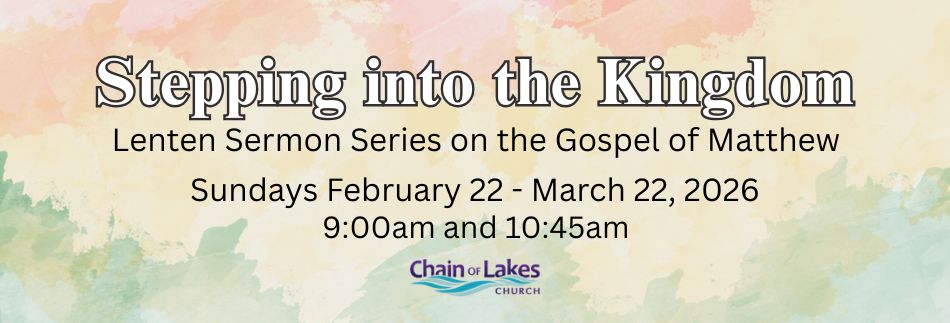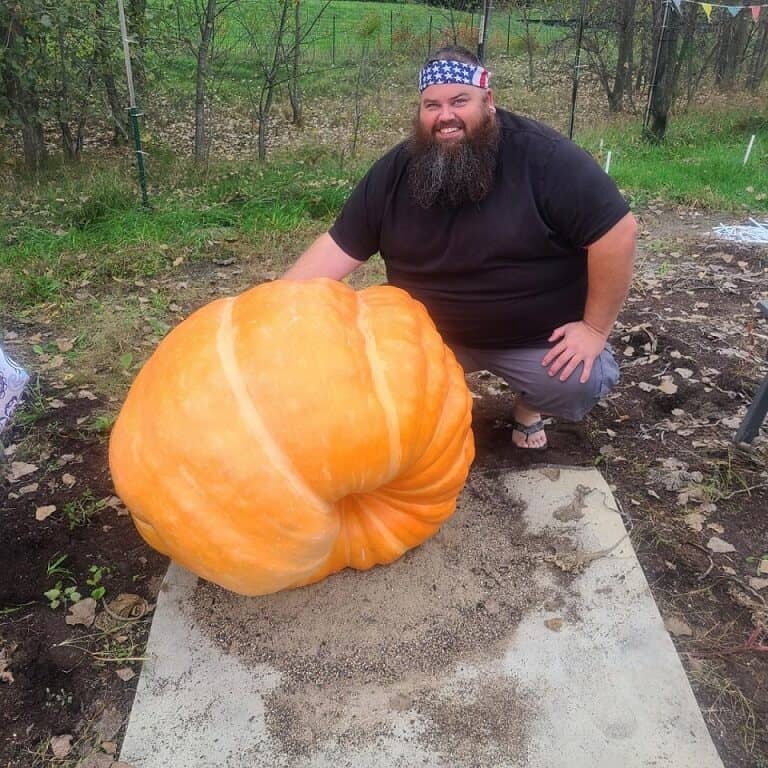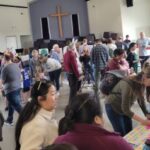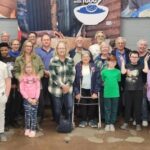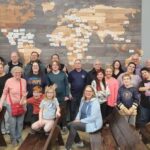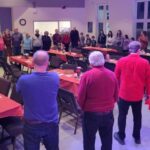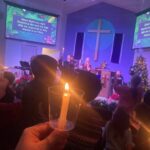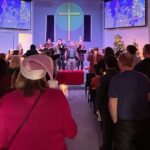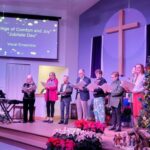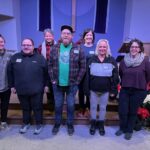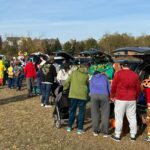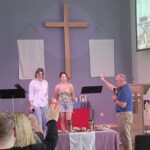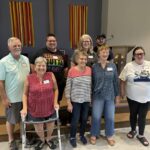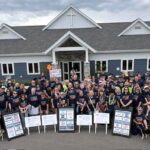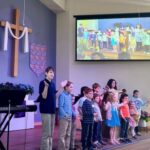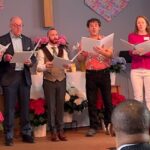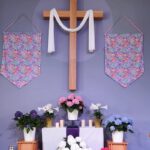Monday, March 2
Matthew 8-9:34
Jesus Cleanses a Man
When Jesus had come down from the mountain, great crowds followed him, and there was a man with a skin disease who came to him and knelt before him, saying, “Lord, if you are willing, you can make me clean.” He stretched out his hand and touched him, saying, “I am willing. Be made clean!” Immediately his skin disease was cleansed. Then Jesus said to him, “See that you say nothing to anyone, but go, show yourself to the priest, and offer the gift that Moses commanded, as a testimony to them.”
Jesus Heals a Centurion’s Servant
When he entered Capernaum, a centurion came to him, appealing to him and saying, “Lord, my servant is lying at home paralyzed, in terrible distress.” And he said to him, “I will come and cure him.” The centurion answered, “Lord, I am not worthy to have you come under my roof, but only speak the word, and my servant will be healed. For I also am a man under authority, with soldiers under me, and I say to one, ‘Go,’ and he goes, and to another, ‘Come,’ and he comes, and to my slave, ‘Do this,’ and the slave does it.” When Jesus heard him, he was amazed and said to those who followed him, “Truly I tell you, in no one in Israel have I found such faith. I tell you, many will come from east and west and will take their places at the banquet with Abraham and Isaac and Jacob in the kingdom of heaven, while the heirs of the kingdom will be thrown into the outer darkness, where there will be weeping and gnashing of teeth.” And Jesus said to the centurion, “Go; let it be done for you according to your faith.” And the servant was healed in that hour.
Jesus Heals Many at Peter’s House
When Jesus entered Peter’s house, he saw his mother-in-law lying in bed with a fever; he touched her hand, and the fever left her, and she got up and began to serve him. That evening they brought to him many who were possessed by demons, and he cast out the spirits with a word and cured all who were sick. This was to fulfill what had been spoken through the prophet Isaiah, “He took our infirmities and bore our diseases.”
Would-Be Followers of Jesus
Now when Jesus saw great crowds around him, he gave orders to go over to the other side. A scribe then approached and said, “Teacher, I will follow you wherever you go.” And Jesus said to him, “Foxes have holes, and birds of the air have nests, but the Son of Man has nowhere to lay his head.” Another of his disciples said to him, “Lord, first let me go and bury my father.” But Jesus said to him, “Follow me, and let the dead bury their own dead.”
Jesus Stills the Storm
And when he got into the boat, his disciples followed him. A windstorm suddenly arose on the sea, so great that the boat was being swamped by the waves, but he was asleep. And they went and woke him up, saying, “Lord, save us! We are perishing!” And he said to them, “Why are you afraid, you of little faith?” Then he got up and rebuked the winds and the sea, and there was a dead calm. They were amazed, saying, “What sort of man is this, that even the winds and the sea obey him?”
Jesus Heals Two Men
When he came to the other side, to the region of the Gadarenes, two men possessed by demons came out of the tombs and met him. They were so fierce that no one could pass that way. Suddenly they shouted, “What have you to do with us, Son of God? Have you come here to torment us before the time?” Now a large herd of swine was feeding at some distance from them. The demons begged him, “If you cast us out, send us into the herd of swine.” And he said to them, “Go!” So they came out and entered the swine, and suddenly, the whole herd stampeded down the steep bank into the sea and drowned in the water. The swineherds ran off, and, going into the town, they told the whole story about what had happened to the men possessed by demons. Then the whole town came out to meet Jesus, and when they saw him they begged him to leave their region. And after getting into a boat he crossed the sea and came to his own town.
Jesus Heals a Paralytic
And some people were carrying to him a paralyzed man lying on a stretcher. When Jesus saw their faith, he said to the paralytic, “Take heart, child; your sins are forgiven.” Then some of the scribes said to themselves, “This man is blaspheming.” But Jesus, perceiving their thoughts, said, “Why do you think evil in your hearts? For which is easier: to say, ‘Your sins are forgiven,’ or to say, ‘Stand up and walk’? But so that you may know that the Son of Man has authority on earth to forgive sins”—he then said to the paralytic—“Stand up, take your bed, and go to your home.” And he stood up and went to his home. When the crowds saw it, they were filled with awe, and they glorified God, who had given such authority to human beings.
The Call of Matthew
As Jesus was walking along, he saw a man called Matthew sitting at the tax-collection station, and he said to him, “Follow me.” And he got up and followed him.
And as he sat at dinner in the house, many tax collectors and sinners came and were sitting with Jesus and his disciples. When the Pharisees saw this, they said to his disciples, “Why does your teacher eat with tax collectors and sinners?” But when he heard this, he said, “Those who are well have no need of a physician, but those who are sick. Go and learn what this means, ‘I desire mercy, not sacrifice.’ For I have not come to call the righteous but sinners.”
The Question about Fasting
Then the disciples of John came to him, saying, “Why do we and the Pharisees fast often, but your disciples do not fast?” And Jesus said to them, “The wedding attendants cannot mourn as long as the bridegroom is with them, can they? The days will come when the bridegroom is taken away from them, and then they will fast. No one sews a piece of unshrunk cloth on an old cloak, for the patch pulls away from the cloak, and a worse tear is made. Neither is new wine put into old wineskins; otherwise, the skins burst, and the wine is spilled, and the skins are ruined, but new wine is put into fresh wineskins, and so both are preserved.”
A Girl Restored to Life and a Woman Healed
While he was saying these things to them, suddenly a leader came in and knelt before him, saying, “My daughter has just died, but come and lay your hand on her, and she will live.” And Jesus got up and followed him, with his disciples. Then suddenly a woman who had been suffering from a flow of blood for twelve years came up behind him and touched the fringe of his cloak, for she was saying to herself, “If I only touch his cloak, I will be made well.” Jesus turned, and seeing her he said, “Take heart, daughter; your faith has made you well.” And the woman was made well from that moment. When Jesus came to the leader’s house and saw the flute players and the crowd making a commotion, he said, “Go away, for the girl is not dead but sleeping.” And they laughed at him. But when the crowd had been put outside, he went in and took her by the hand, and the girl got up. And the report of this spread through all of that district.
Jesus Heals Two Blind Men
As Jesus went on from there, two blind men followed him, crying loudly, “Have mercy on us, Son of David!” When he entered the house, the blind men came to him, and Jesus said to them, “Do you have faith that I can do this?” They said to him, “Yes, Lord.” Then he touched their eyes and said, “According to your faith, let it be done to you.” And their eyes were opened. Then Jesus sternly ordered them, “See that no one knows of this.” But they went away and spread the news about him through all of that district.
Jesus Heals One Who Was Mute
After they had gone away, a demon-possessed man who was mute was brought to him. And when the demon had been cast out, the one who had been mute spoke, and the crowds were amazed and said, “Never has anything like this been seen in Israel.” But the Pharisees were saying, “By the ruler of the demons he casts out the demons.”
This week we continue our reading of Matthew. We’ll look at passages that share how the writer of Matthew viewed Jesus. The Jews had been waiting for a new Messiah. The two greatest leaders in their history were Moses and David, and some of the Jewish people wanted a Moses-like figure who would inspire them to overthrow the Romans. However, even though Jesus identified himself as the Messiah, his understanding of his purpose was much different. He offered a way that would liberate the Jews—and all people—but his liberation was much different than what was expected.
In these two chapters, Matthew shared ten miracles. In placing these ten miracles in this order some think that Matthew wanted the readers of his gospel to recall the ten miracles that Moses performed in Egypt.
These miracles probably didn’t happen in this precise historical order, but Matthew was editing the story of Jesus to make his point about Jesus.
Which of these healing stories speaks most to you? Which of these stories illustrates Jesus to you? Please share.
Tuesday, March 3
Matthew 9:35-10:42
The Harvest Is Great, the Laborers Few
Then Jesus went about all the cities and villages, teaching in their synagogues and proclaiming the good news of the kingdom and curing every disease and every sickness. When he saw the crowds, he had compassion for them because they were harassed and helpless, like sheep without a shepherd. Then he said to his disciples, “The harvest is plentiful, but the laborers are few; therefore ask the Lord of the harvest to send out laborers into his harvest.”
The Twelve Apostles
Then Jesus summoned his twelve disciples and gave them authority over unclean spirits, to cast them out, and to cure every disease and every sickness. These are the names of the twelve apostles: first, Simon, also known as Peter, and his brother Andrew; James son of Zebedee and his brother John; Philip and Bartholomew; Thomas and Matthew the tax collector; James son of Alphaeus and Thaddaeus; Simon the Cananaean and Judas Iscariot, the one who betrayed him.
The Mission of the Twelve
These twelve Jesus sent out with the following instructions: “Do not take a road leading to gentiles, and do not enter a Samaritan town, but go rather to the lost sheep of the house of Israel. As you go, proclaim the good news, ‘The kingdom of heaven has come near. Cure the sick; raise the dead; cleanse those with a skin disease; cast out demons. You received without payment; give without payment. Take no gold, or silver, or copper in your belts, no bag for your journey, or two tunics, or sandals, or a staff, for laborers deserve their food. Whatever town or village you enter, find out who in it is worthy, and stay there until you leave. As you enter the house, greet it. If the house is worthy, let your peace come upon it, but if it is not worthy, let your peace return to you. If anyone will not welcome you or listen to your words, shake off the dust from your feet as you leave that house or town. Truly I tell you, it will be more tolerable for the land of Sodom and Gomorrah on the day of judgment than for that town.
Coming Persecutions
“I am sending you out like sheep into the midst of wolves, so be wise as serpents and innocent as doves. Beware of them, for they will hand you over to councils and flog you in their synagogues, and you will be dragged before governors and kings because of me, as a testimony to them and the gentiles. When they hand you over, do not worry about how you are to speak or what you are to say, for what you are to say will be given to you at that time, for it is not you who speak, but the Spirit of your Father speaking through you. Sibling will betray sibling to death and a father his child, and children will rise against parents and have them put to death, and you will be hated by all because of my name. But the one who endures to the end will be saved. When they persecute you in this town, flee to the next, for truly I tell you, you will not have finished going through all the towns of Israel before the Son of Man comes.
“A disciple is not above the teacher nor a slave above the master; it is enough for the disciple to be like the teacher and the slave like the master. If they have called the master of the house Beelzebul, how much more will they malign those of his household!
Whom to Fear
“So have no fear of them, for nothing is covered up that will not be uncovered and nothing secret that will not become known. What I say to you in the dark, tell in the light, and what you hear whispered, proclaim from the housetops. Do not fear those who kill the body but cannot kill the soul; rather, fear the one who can destroy both soul and body in hell. Are not two sparrows sold for a penny? Yet not one of them will fall to the ground apart from your Father. And even the hairs of your head are all counted. So do not be afraid; you are of more value than many sparrows.
“Everyone, therefore, who acknowledges me before others, I also will acknowledge before my Father in heaven, but whoever denies me before others, I also will deny before my Father in heaven.
Not Peace, but a Sword
“Do not think that I have come to bring peace to the earth; I have not come to bring peace but a sword.
For I have come to set a man against his father,
and a daughter against her mother,
and a daughter-in-law against her mother-in-law,
and one’s foes will be members of one’s own household.
“Whoever loves father or mother more than me is not worthy of me, and whoever loves son or daughter more than me is not worthy of me, and whoever does not take up the cross and follow me is not worthy of me. Those who find their life will lose it, and those who lose their life for my sake will find it.
Rewards
“Whoever welcomes you welcomes me, and whoever welcomes me welcomes the one who sent me. Whoever welcomes a prophet in the name of a prophet will receive a prophet’s reward, and whoever welcomes a righteous person in the name of a righteous person will receive the reward of the righteous, and whoever gives even a cup of cold water to one of these little ones in the name of a disciple—truly I tell you, none of these will lose their reward.”
In these verses Jesus gave instructions to his apostles. He sent them out two by two into the villages to proclaim his message.
In these instructions he talks about success and failure. If the apostles weren’t welcomed in a village they were to shake the dust off their shoes and leave. Sharing their message was not like a sales job. They weren’t to stay in a village and convert people who didn’t want to be converted.
In the last three verses Matthew shared a story about how Jesus understood success for his apostles. The indicator of success was whether an apostle was welcomed by others. The word “welcome” is used six times in these three verses.
One of the Core Values of Chain of Lakes is Hospitality. It is understood to mean that “We will go out of our way to welcome people as Jesus welcomed them, with an open heart and open arms.”
What are some ways you see this welcome shared at Chain of Lakes? What are some ways you can share this welcome with others? Please share.
Wednesday, March 4
Matthew 11
Now when Jesus had finished instructing his twelve disciples, he went on from there to teach and proclaim his message in their cities.
Messengers from John the Baptist
When John heard in prison what the Messiah was doing, he sent word by his disciples and said to him, “Are you the one who is to come, or are we to wait for another?” Jesus answered them, “Go and tell John what you hear and see: the blind receive their sight, the lame walk, those with a skin disease are cleansed, the deaf hear, the dead are raised, and the poor have good news brought to them. And blessed is anyone who takes no offense at me.”
Jesus Praises John the Baptist
As they went away, Jesus began to speak to the crowds about John: “What did you go out into the wilderness to look at? A reed shaken by the wind? What, then, did you go out to see? Someone dressed in soft robes? Look, those who wear soft robes are in royal palaces. What, then, did you go out to see? A prophet? Yes, I tell you, and more than a prophet. This is the one about whom it is written,
‘See, I am sending my messenger ahead of you,
who will prepare your way before you.’
“Truly I tell you, among those born of women no one has arisen greater than John the Baptist, yet the least in the kingdom of heaven is greater than he. From the days of John the Baptist until now, the kingdom of heaven has suffered violence, and violent people take it by force. For all the Prophets and the Law prophesied until John came, and if you are willing to accept it, he is Elijah who is to come. Let anyone with ears listen!
“But to what will I compare this generation? It is like children sitting in the marketplaces and calling to one another,
‘We played the flute for you, and you did not dance;
we wailed, and you did not mourn.’
“For John came neither eating nor drinking, and they say, ‘He has a demon’; the Son of Man came eating and drinking, and they say, ‘Look, a glutton and a drunkard, a friend of tax collectors and sinners!’ Yet wisdom is vindicated by her deeds.”
Woes to Unrepentant Cities
Then he began to reproach the cities in which most of his deeds of power had been done because they did not repent. “Woe to you, Chorazin! Woe to you, Bethsaida! For if the deeds of power done in you had been done in Tyre and Sidon, they would have repented long ago in sackcloth and ashes. But I tell you, on the day of judgment it will be more tolerable for Tyre and Sidon than for you. And you, Capernaum,
will you be exalted to heaven?
“No, you will be brought down to Hades.
For if the deeds of power done in you had been done in Sodom, it would have remained until this day. But I tell you that on the day of judgment it will be more tolerable for the land of Sodom than for you.”
Jesus Thanks His Father
At that time Jesus said, “I thank you, Father, Lord of heaven and earth, because you have hidden these things from the wise and the intelligent and have revealed them to infants; yes, Father, for such was your gracious will. All things have been handed over to me by my Father, and no one knows the Son except the Father, and no one knows the Father except the Son and anyone to whom the Son chooses to reveal him.
“Come to me, all you who are weary and are carrying heavy burdens, and I will give you rest. Take my yoke upon you, and learn from me, for I am gentle and humble in heart, and you will find rest for your souls. For my yoke is easy, and my burden is light.”
It took a long time for the message of Jesus to be accepted. Even John the Baptist wasn’t sure if Jesus was the Messiah. John had shared a strong message of repentance and baptism. He was quite strong in his preaching about the need for people to repent.
Jesus believed in repentance, but his message went beyond repentance. He also wanted to help people, especially those who were outcasts. He told the messengers of John that they should tell John what Jesus was doing. Jesus was giving sight to the blind, healing the lame, cleansing lepers, bringing hearing to those who were deaf, raising the dead, and bringing good news to the poor.
If someone asked you to share the primary message of Jesus, would you share a message similar to what Jesus shared in this chapter?
At the end of this chapter Jesus shared a message of comfort. People who were in distress could come to Jesus and experience spiritual rest. These words from Jesus are so important that Pastor Paul shares them as a welcome to celebrate Communion. They were shared this past Sunday when the congregation celebrated Communion.
How powerful that these words of Jesus are still relevant today!
What are your thoughts about this chapter? Please share.
Thursday, March 5
Matthew 12
Plucking Grain on the Sabbath
At that time Jesus went through the grain fields on the Sabbath; his disciples were hungry, and they began to pluck heads of grain and to eat. When the Pharisees saw it, they said to him, “Look, your disciples are doing what is not lawful to do on the Sabbath.” He said to them, “Have you not read what David did when he and his companions were hungry? How he entered the house of God, and they ate the bread of the Presence, which it was not lawful for him or his companions to eat, but only for the priests? Or have you not read in the law that on the Sabbath the priests in the temple break the Sabbath and yet are guiltless? I tell you, something greater than the temple is here. But if you had known what this means, ‘I desire mercy and not sacrifice,’ you would not have condemned the guiltless. For the Son of Man is lord of the Sabbath.”
The Man with a Withered Hand
He left that place and entered their synagogue; a man was there with a withered hand, and they asked him, “Is it lawful to cure on the Sabbath?” so that they might accuse him. He said to them, “Suppose one of you has only one sheep and it falls into a pit on the Sabbath; will you not lay hold of it and lift it out? How much more valuable is a human being than a sheep! So it is lawful to do good on the Sabbath.” Then he said to the man, “Stretch out your hand.” He stretched it out, and it was restored, as sound as the other. But the Pharisees went out and conspired against him, how to destroy him.
God’s Chosen Servant
When Jesus became aware of this, he departed. Many followed him, and he cured all of them, and he ordered them not to make him known. This was to fulfill what had been spoken through the prophet Isaiah:
“Here is my servant, whom I have chosen,
my beloved, with whom my soul is well pleased.
I will put my Spirit upon him,
and he will proclaim justice to the gentiles.
He will not wrangle or cry aloud,
nor will anyone hear his voice in the streets.
He will not break a bruised reed
or quench a smoldering wick
until he brings justice to victory.
And in his name the gentiles will hope.”
Jesus and Beelzebul
Then they brought to him a demon-possessed man who was blind and mute, and he cured him, so that the one who had been mute could speak and see. All the crowds were amazed and were saying, “Can this be the Son of David?” But when the Pharisees heard it, they said, “It is only by Beelzebul, the ruler of the demons, that this man casts out the demons.” He knew what they were thinking and said to them, “Every kingdom divided against itself is laid waste, and no city or house divided against itself will stand. If Satan casts out Satan, he is divided against himself; how, then, will his kingdom stand? If I cast out demons by Beelzebul, by whom do your own exorcists cast them out? Therefore they will be your judges. But if it is by the Spirit of God that I cast out demons, then the kingdom of God has come upon you. Or how can one enter a strong man’s house and plunder his property without first tying up the strong man? Then indeed the house can be plundered. Whoever is not with me is against me, and whoever does not gather with me scatters. Therefore I tell you, people will be forgiven for every sin and blasphemy, but blasphemy against the Spirit will not be forgiven. Whoever speaks a word against the Son of Man will be forgiven, but whoever speaks against the Holy Spirit will not be forgiven, either in this age or in the age to come.
A Tree and Its Fruit
“Either make the tree good and its fruit good, or make the tree bad and its fruit bad, for the tree is known by its fruit. You brood of vipers! How can you speak good things when you are evil? For out of the abundance of the heart the mouth speaks. The good person brings good things out of a good treasure, and the evil person brings evil things out of an evil treasure. I tell you, on the day of judgment you will have to give an account for every careless word you utter, for by your words you will be justified, and by your words you will be condemned.”
The Sign of Jonah
Then some of the scribes and Pharisees said to him, “Teacher, we wish to see a sign from you.” But he answered them, “An evil and adulterous generation asks for a sign, but no sign will be given to it except the sign of the prophet Jonah. For just as Jonah was three days and three nights in the belly of the sea monster, so for three days and three nights the Son of Man will be in the heart of the earth. The people of Nineveh will rise up at the judgment with this generation and condemn it, because they repented at the proclamation of Jonah, and indeed something greater than Jonah is here! The queen of the South will rise up at the judgment with this generation and condemn it, because she came from the ends of the earth to listen to the wisdom of Solomon, and indeed something greater than Solomon is here!
The Return of the Unclean Spirit
“When the unclean spirit has gone out of a person, it wanders through waterless regions looking for a resting place, but it finds none. Then it says, ‘I will return to my house from which I came.’ When it returns, it finds it empty, swept, and put in order. Then it goes and brings along seven other spirits more evil than itself, and they enter and live there, and the last state of that person is worse than the first. So will it be also with this evil generation.”
The True Kindred of Jesus
While he was still speaking to the crowds, his mother and his brothers were standing outside, wanting to speak to him. Someone told him, “Look, your mother and your brothers are standing outside, wanting to speak to you.” But to the one who had told him this, Jesus replied, “Who is my mother, and who are my brothers?” And pointing to his disciples, he said, “Here are my mother and my brothers! For whoever does the will of my Father in heaven is my brother and sister and mother.”
In this chapter we see the contrast between Jesus and the religious leaders, the Pharisees. Jesus believed in following the law, but he wanted to reform the law so that it helped people. If the law prevented him from helping others, he would go a different way. He didn’t hesitate at all to heal a man who had a withered hand in a synagogue on the Sabbath.
However, for the Pharisees this healing was a violation of the Sabbath. From then on they looked for ways to destroy or kill Jesus.
We get a hint from Jesus for the first time in Matthew of his impending death and resurrection. In verses 38-42 he said that just as Jonah was in the belly of a whale for three days, he would be in the heart of the earth. Another way to say this is Jesus would die and then three days later be raised from the dead.
What are your thoughts about Jesus breaking the law? If you had been a religious leader at the time, do you think you would have been threatened by Jesus? Please share.
Friday, March 6
Matthew 13
The Parable of the Sower
That same day Jesus went out of the house and sat beside the sea. Such great crowds gathered around him that he got into a boat and sat there, while the whole crowd stood on the beach. And he told them many things in parables, saying: “Listen! A sower went out to sow. And as he sowed, some seeds fell on a path, and the birds came and ate them up. Other seeds fell on rocky ground, where they did not have much soil, and they sprang up quickly, since they had no depth of soil. But when the sun rose, they were scorched, and since they had no root, they withered away. Other seeds fell among thorns, and the thorns grew up and choked them. Other seeds fell on good soil and brought forth grain, some a hundredfold, some sixty, some thirty. If you have ears, hear!”
The Purpose of the Parables
Then the disciples came and asked him, “Why do you speak to them in parables?” He answered, “To you it has been given to know the secrets of the kingdom of heaven, but to them it has not been given. For to those who have, more will be given, and they will have an abundance, but from those who have nothing, even what they have will be taken away. The reason I speak to them in parables is that ‘seeing they do not perceive, and hearing they do not listen, nor do they understand.’ With them indeed is fulfilled the prophecy of Isaiah that says:
‘You will indeed listen but never understand,
and you will indeed look but never perceive.
For this people’s heart has grown dull,
and their ears are hard of hearing,
and they have shut their eyes,
so that they might not look with their eyes,
and hear with their ears
and understand with their heart and turn—
and I would heal them.’
“But blessed are your eyes, for they see, and your ears, for they hear. Truly I tell you, many prophets and righteous people longed to see what you see but did not see it and to hear what you hear but did not hear it.
The Parable of the Sower Explained
“Hear, then, the parable of the sower. When anyone hears the word of the kingdom and does not understand it, the evil one comes and snatches away what is sown in the heart; this is what was sown on the path. As for what was sown on rocky ground, this is the one who hears the word and immediately receives it with joy, yet such a person has no root but endures only for a while, and when trouble or persecution arises on account of the word, that person immediately falls away. As for what was sown among thorns, this is the one who hears the word, but the cares of this age and the lure of wealth choke the word, and it yields nothing. But as for what was sown on good soil, this is the one who hears the word and understands it, who indeed bears fruit and yields in one case a hundredfold, in another sixty, and in another thirty.”
The Parable of Weeds among the Wheat
He put before them another parable: “The kingdom of heaven may be compared to someone who sowed good seed in his field, but while everybody was asleep an enemy came and sowed weeds among the wheat and then went away. So when the plants came up and bore grain, then the weeds appeared as well. And the slaves of the householder came and said to him, ‘Master, did you not sow good seed in your field? Where, then, did these weeds come from?’ He answered, ‘An enemy has done this.’ The slaves said to him, ‘Then do you want us to go and gather them?’ But he replied, ‘No, for in gathering the weeds you would uproot the wheat along with them. Let both of them grow together until the harvest, and at harvest time I will tell the reapers, Collect the weeds first and bind them in bundles to be burned, but gather the wheat into my barn.’ ”
The Parable of the Mustard Seed
He put before them another parable: “The kingdom of heaven is like a mustard seed that someone took and sowed in his field; it is the smallest of all the seeds, but when it has grown it is the greatest of shrubs and becomes a tree, so that the birds of the air come and make nests in its branches.”
The Parable of the Yeast
He told them another parable: “The kingdom of heaven is like yeast that a woman took and mixed in with three measures of flour until all of it was leavened.”
The Use of Parables
Jesus told the crowds all these things in parables; without a parable he told them nothing. This was to fulfill what had been spoken through the prophet:
“I will open my mouth to speak in parables;
I will proclaim what has been hidden since the foundation.”
Jesus Explains the Parable of the Weeds
Then he left the crowds and went into the house. And his disciples approached him, saying, “Explain to us the parable of the weeds of the field.” He answered, “The one who sows the good seed is the Son of Man; the field is the world, and the good seed are the children of the kingdom; the weeds are the children of the evil one, and the enemy who sowed them is the devil; the harvest is the end of the age, and the reapers are angels. Just as the weeds are collected and burned up with fire, so will it be at the end of the age. The Son of Man will send his angels, and they will collect out of his kingdom all causes of sin and all evildoers, and they will throw them into the furnace of fire, where there will be weeping and gnashing of teeth. Then the righteous will shine like the sun in the kingdom of their Father. Let anyone with ears listen!
Three Parables
“The kingdom of heaven is like treasure hidden in a field, which a man found and reburied; then in his joy he goes and sells all that he has and buys that field.
“Again, the kingdom of heaven is like a merchant in search of fine pearls; on finding one pearl of great value, he went and sold all that he had and bought it.
“Again, the kingdom of heaven is like a net that was thrown into the sea and caught fish of every kind; when it was full, they drew it ashore, sat down, and put the good into baskets but threw out the bad. So it will be at the end of the age. The angels will come out and separate the evil from the righteous and throw them into the furnace of fire, where there will be weeping and gnashing of teeth.
Treasures New and Old
“Have you understood all this?” They answered, “Yes.” And he said to them, “Therefore every scribe who has become a disciple in the kingdom of heaven is like the master of a household who brings out of his treasure what is new and what is old.” When Jesus had finished these parables, he left that place.
The Rejection of Jesus at Nazareth
He came to his hometown and began to teach the people in their synagogue, so that they were astounded and said, “Where did this man get this wisdom and these deeds of power? Is not this the carpenter’s son? Is not his mother called Mary? And are not his brothers James and Joseph and Simon and Judas? And are not all his sisters with us? Where then did this man get all this?” And they took offense at him. But Jesus said to them, “Prophets are not without honor except in their own hometown and in their own house.” And he did not do many deeds of power there, because of their unbelief.
The parable of the sower of soils is a significant one for us. One way to interpret the parable is to ask ourselves the question, “what soil describes our own heart?”
Is our heart like a path where the Word or seeds are put, but quickly eaten by birds or taken away?
Is our heart like a rocky ground where the Word or seeds can take root quickly, but because the seeds have no root, they quickly are scorched when the hot sun comes out.
Do we have thorns in our heart where the Word or seeds are easily choked?
Or is our heart like good soil where the Word or seeds put forth grain, some a hundredfold and some sixty and some thirty.
Sometimes like a garden we need the soil in our heart to be turned over. Our spiritual disciplines can keep our soil rich and not hard. When we worship, participate in a small group, serve and give financially we can turn over the soil in our heart.
Which of these soils describe the spiritual condition of your heart? Please share.
Saturday, March 7
Matthew 14
The Death of John the Baptist
At that time Herod the ruler heard reports about Jesus, and he said to his servants, “This is John the Baptist; he has been raised from the dead, and for this reason these powers are at work in him.” For Herod had arrested John, bound him, and put him in prison on account of Herodias, his brother Philip’s wife, because John had been telling him, “It is not lawful for you to have her.” Though Herod wanted to put him to death, he feared the crowd, because they regarded him as a prophet. But when Herod’s birthday came, the daughter of Herodias danced before the company, and she pleased Herod so much that he promised on oath to grant her whatever she might ask. Prompted by her mother, she said, “Give me the head of John the Baptist here on a platter.” The king was grieved, yet out of regard for his oaths and for the guests, he commanded it to be given; he sent and had John beheaded in the prison. His head was brought on a platter and given to the girl, who brought it to her mother. His disciples came and took the body and buried him; then they went and told Jesus.
Feeding the Five Thousand
Now when Jesus heard this, he withdrew from there in a boat to a deserted place by himself. But when the crowds heard it, they followed him on foot from the towns. When he went ashore, he saw a great crowd, and he had compassion for them and cured their sick. When it was evening, the disciples came to him and said, “This is a deserted place, and the hour is now late; send the crowds away so that they may go into the villages and buy food for themselves.” Jesus said to them, “They need not go away; you give them something to eat.” They replied, “We have nothing here but five loaves and two fish.” And he said, “Bring them here to me.” Then he ordered the crowds to sit down on the grass. Taking the five loaves and the two fish, he looked up to heaven and blessed and broke the loaves and gave them to the disciples, and the disciples gave them to the crowds. And all ate and were filled, and they took up what was left over of the broken pieces, twelve baskets full. And those who ate were about five thousand men, besides women and children.
Jesus Walks on the Water
Immediately he made the disciples get into a boat and go on ahead to the other side, while he dismissed the crowds. And after he had dismissed the crowds, he went up the mountain by himself to pray. When evening came, he was there alone, but by this time the boat, battered by the waves, was far from the land, for the wind was against them. And early in the morning he came walking toward them on the sea. But when the disciples saw him walking on the sea, they were terrified, saying, “It is a ghost!” And they cried out in fear. But immediately Jesus spoke to them and said, “Take heart, it is I; do not be afraid.”
Peter answered him, “Lord, if it is you, command me to come to you on the water.” He said, “Come.” So Peter got out of the boat, started walking on the water, and came toward Jesus. But when he noticed the strong wind, he became frightened, and, beginning to sink, he cried out, “Lord, save me!” Jesus immediately reached out his hand and caught him, saying to him, “You of little faith, why did you doubt?” When they got into the boat, the wind ceased. And those in the boat worshiped him, saying, “Truly you are the Son of God.”
Jesus Heals the Sick in Gennesaret
When they had crossed over, they came to land at Gennesaret. After the people of that place recognized him, they sent word to that whole surrounding region, and people brought all who were sick to him and begged him that they might touch even the fringe of his cloak, and all who touched it were healed.
The first twenty-one verses of this chapter share the compassion in Jesus’ heart. We can learn quite a lot about Jesus in these stories.
Jesus had just found out that John had been brutally executed by Herod. Herod was so prideful and arrogant that when he was overwhelmed by his niece’s dance he promised her one wish. She and her mom asked for John’s head to be put on a platter.
This was horrible. When Jesus found out about it he withdrew to be by himself. But the crowds found him and chased him down.
Instead of being resentful that the crowds had interrupted his grief, Jesus was full of compassion.
What an example of a beautiful heart!
What are your thoughts about this story? Please share.


